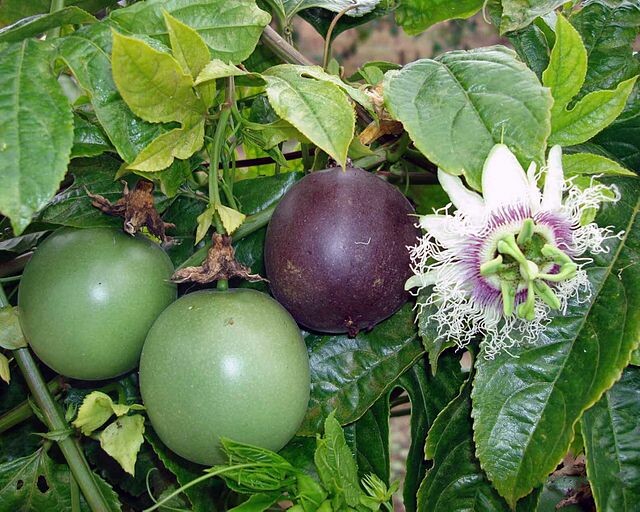Written by Don Richardson

 Passion Fruit (Passiflora Edulis) Purple Possum
Passion Fruit (Passiflora Edulis) Purple PossumPlant Type | Perennial Vine |
Size | 30’ tall |
Sun Exposure | part shade – full shade |
Soil Type | sand, loam |
Soil pH | 5.5-7.5 acidic - neutral |
Bloom Time | Most all year, harvest in fall |
Hardiness Zones | 9-12 Food Forest Plant |
Moisture | Moist, rich, well drained |
Cold/Heat | 25°F – |
Pollination | Self-pollinates |
Edible Plant | Yes |
Medicinal Plant | Yes |
Any reference to medicinal or culinary use of plants or plant parts should in no way be considered an endorsement by The Ocala Food Forest or its staff. Research is crucial in safe and proper consumption or experimentational use of any plant.
The Passiflora Edulis, commonly known as the passion fruit plant, is a beautiful and fragrant vining plant native to South America. It's a member of the Passifloraceae family, which contains over 500 species of plants. This plant produces an edible fruit that has become popular around the world for its sweet and tart flavor. This article will provide an overview of the Passiflora Edulis and discuss its many benefits.
Origins of the Passiflora Edulis Plant
The Passiflora Edulis is believed to have originated in Paraguay and southern Brazil before being spread throughout South America and other regions by Spanish missionaries. It was first introduced to Europe in 1771 by French Botanist Charles Plumier and later spread to other parts of the world. Today, Passion Fruit is cultivated in tropical climates across the globe from Southeast Asia to North America.
Characteristics of the Plant
The Passiflora Edulis vine can grow up to 30 feet in length with intricate leaves that range from 5-9 inches long. The flowers are white on top with purple petals that measure 2-3 inches in diameter. The flowers are very fragrant and attract hummingbirds, butterflies, and bees. The fruit itself is round or ovoid shape with a yellow or dark purple skin depending on the variety. Inside each fruit you will find hundreds of seeds surrounded by a sweet yet tart pulp which can be used fresh or processed into juices, jams, jellies, and syrups.
Fruit Production & Uses
The Passiflora Edulis plant requires warm temperatures between 65–90°F (18–32°C) for growth and optimum yields of fruit production can be achieved when temperatures are between 75-85°F (24-29°C). The fruits are usually harvested once they turn yellow or dark purple and drop off their vines naturally. Afterwards they may be sold fresh or processed into various products such as juice concentrate, jams, jellies, ice creams, smoothies, sauces, syrups, liqueurs and other culinary preparations because of its intense flavor and aroma.
The Passiflora Edulis has been used for centuries in folk medicine due to its high content of vitamins A and C as well as minerals such as calcium and phosphorus. It's also used in teas due to its calming effects on the body and mind. Additionally, the oil from the seeds is often extracted for use in cosmetics and perfumes due to its moisturizing properties.
Growing & Care Tips
The Passiflora Edulis grows best in warm climates with plenty of sunlight but can tolerate light shade for part of the day. It prefers well-drained soil that's high in organic matter (like compost) but can tolerate some clay if drainage is adequate. To keep your passion fruit plant healthy, it's important to water regularly (especially during dry spells) but avoid over-watering as this can lead to root rot or other fungal diseases. Additionally, you should periodically prune back any overgrown vines to encourage new growth while keeping a neat appearance. Finally, be sure to fertilize at least once every two months using a good quality fertilizer specifically formulated for passion fruits plants or citrus trees (which share similar nutritional needs).
Conclusion:
In conclusion, the Passiflora Edulis (Passion Fruit Plant) is an attractive evergreen vine that produces fragrant flowers followed by edible fruit packed full of nutrients. Not only does it have medicinal uses but also culinary applications due to its strong flavor profile making it perfect for jams and jellies as well as liqueurs or even cosmetics! With proper care this beautiful plant can thrive indoors or outdoors bringing color and life wherever it grows! If you're looking for an easy-to-care-for plant that packs a punch with flavor, then look no further than the Passiflora Edulis!
In conclusion, the Passiflora Edulis (Passion Fruit Plant) is an attractive evergreen vine that produces fragrant flowers followed by edible fruit packed full of nutrients. Not only does it have medicinal uses but also culinary applications due to its strong flavor profile making it perfect for jams and jellies as well as liqueurs or even cosmetics! With proper care this beautiful plant can thrive indoors or outdoors bringing color and life wherever it grows! If you're looking for an easy-to-care-for plant that packs a punch with flavor, then look no further than the Passiflora Edulis!









0 Comments